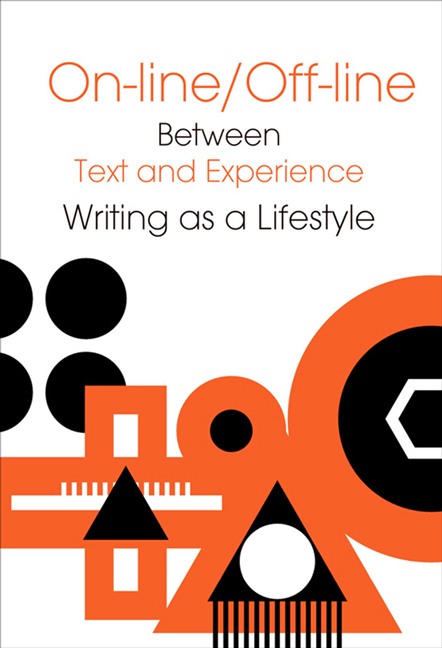Book contents
- Frontmatter
- Contents
- Editors’ Introduction
- ON-LINE/ OFF-LINE
- LITERATURE AND CONVERGENCE
- Poetics in the Age of Convergence
- Convergence and Communication: Genre Analysis of the websites of Polish Writers
- Towards a Generic Analysis of the Microblog (Based on a Study of Twitter)
- How Does the Hybrid Work of Art Exist?
- Liberature in Relation to the Reconfiguration of Aisthesis
- Literature in/of the City – Introductory Comments
- Literary Studies, History and Popular Culture – the Spaces of Convergence
- Afterpop: the Almost Perfect Convergence
- Transcultural Convergence? Polish Poets and Artists and the Oriental Verbo-visuality
- From an E-narrative Poem towards an Interactive Work of Art. Media Convergence Illustrated with DOWN by Zenon Fajfer and The Surprising Spiral by Ken Feingold
Bibliographical notes
from LITERATURE AND CONVERGENCE
Published online by Cambridge University Press: 12 January 2018
- Frontmatter
- Contents
- Editors’ Introduction
- ON-LINE/ OFF-LINE
- LITERATURE AND CONVERGENCE
- Poetics in the Age of Convergence
- Convergence and Communication: Genre Analysis of the websites of Polish Writers
- Towards a Generic Analysis of the Microblog (Based on a Study of Twitter)
- How Does the Hybrid Work of Art Exist?
- Liberature in Relation to the Reconfiguration of Aisthesis
- Literature in/of the City – Introductory Comments
- Literary Studies, History and Popular Culture – the Spaces of Convergence
- Afterpop: the Almost Perfect Convergence
- Transcultural Convergence? Polish Poets and Artists and the Oriental Verbo-visuality
- From an E-narrative Poem towards an Interactive Work of Art. Media Convergence Illustrated with DOWN by Zenon Fajfer and The Surprising Spiral by Ken Feingold
Summary
Peter Gärdenfors, PhD, (b. 1949)
Professor in Cognitive Science at Lund University since 1988. Adjunct pro-fessor at University of Technology Sydney since 2012.
Main current research interests are concept formation, cognitive se-mantics, and the evolution of cognition. His publications include the fol-lowing books: Knowledge in Flux: Modeling the Dynamics of Epistemic States, MIT Press, 1988. Conceptual Spaces, MIT Press, 2000. How Homo Became Sapiens: On the Evolution of Thinking, Oxford University Press, 2003. The Dynamics of Thought, Springer Verlag, 2005, The Geometry of Meaning: Semantics Based on Conceptual Spaces, MIT Press 2014. Member of the Royal Swedish Academy of Letters, History and Antiquities since 1996.Member of Academia Europaea since 1999.Member of Leopoldina Deutsche Akademie für Naturforscher since 2004. Member of the Royal Swedish Academy of Science since 2009. Member of the Prize Committee for the Prize in Economic Sciences in Memory of Alfred Nobel since 2011.
William Powers
William Powers is the author of the New York Times bestseller, Hamlet's BlackBerry. Widely praised for its insights on the digital future, the book grew out of a paper he wrote as a Shorenstein Fellow at Harvard's John F. Kennedy School of Government. The book has been selected as the Common Read at a number of U.S.colleges and universities and pub-lished in many other languages including Chinese, Korean, Polish, Ger-man and Russian. He is currently a research scientist at the Laboratory for Social Machines at the MIT Media Lab, developing new technologies to solve problems in governance, journalism and other sectors of the pub-lic sphere.A former Washington Post staff writer, he is a two-time winner of the U.S. National Press Club's Rowse Award for best American media commentary. In recent years, he has spoken at South By Southwest, the Aspen Ideas Festival and many other conferences and organizations.
Jarosław Płuciennik, PhD, (b. 1966)
Professor Ordinarius of the Humanities at Chair of Theory of Literature, at the Institute of Contemporary Culture, University of Lodz, Poland with specialization in literary culture, cognitive semiotics, and new media of reading. He published among others 7 books, co-edited several volumes, both in Polish and English. He is Pro-Vice-Chancellor for Curricula and Quality Assurance and Enhancement at the University of Lodz, the Edi-tor-in-Chief of the Problems of Literary Genres, and the Head of the Chair of Theory of Literature at the Institute of Contemporary Culture, Univer-sity of Lodz, Poland.
- Type
- Chapter
- Information
- On-line/Off-lineBetween Text and Experience: Writing as a Lifestyle, pp. 401 - 402Publisher: Jagiellonian University PressPrint publication year: 2016

